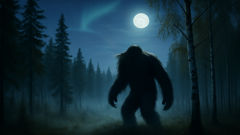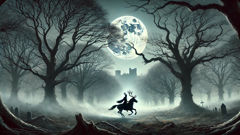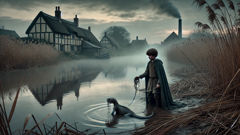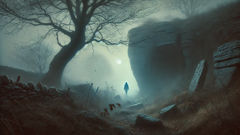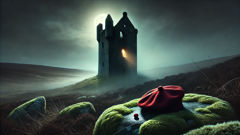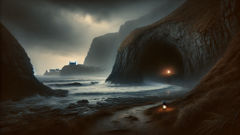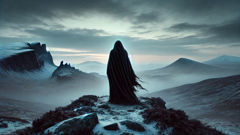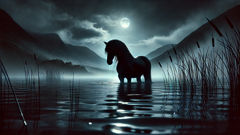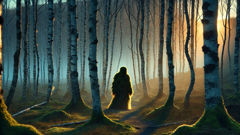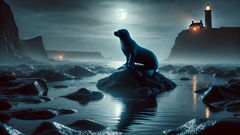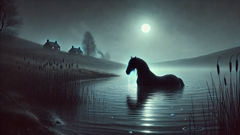Introduction
At the heart of Siberia, where winter reigns for months and the trees stretch endlessly under pale northern skies, a legend stirs with every whisper of the wind. There, amidst vast tracts of taiga, rivers choked with ice, and mountains shrouded in fog, the line between fact and folklore grows thin. This is a land that has always belonged more to nature than to humans—a realm of secrets, survival, and silent awe. Yet for the Evenki, the Yakut, and generations of explorers and wanderers, the wilderness is not empty. It harbors something ancient and elusive: the Chuchunya. Some call it a Siberian yeti, others a ghostly hermit; it is both feared and revered, a living enigma that roams the borders of human understanding. Villagers speak of strange tracks found after snowfalls, of deep, echoing howls on moonless nights, of shadows glimpsed at the edge of vision among the birches and pines. Hunters tell stories of figures towering and furred, gliding silently between the trees, always watching, never fully seen. In recent years, the Chuchunya has leapt from local myth to wider curiosity, as cryptozoologists and skeptics alike have come seeking proof. But the Siberian wilds yield their secrets grudgingly. And so the legend grows, feeding on every encounter, every tale whispered by firelight or scribbled in a faded journal. This is the story of the Chuchunya—not only as a creature, but as a symbol of all that remains untamed and unknowable in the world. It is a journey into the heart of Russia’s northern forests, and into the hearts of those who search for meaning in the deep, unbroken silence.
Whispers in the Frost: The First Signs
The village of Ust-Kut sat quietly along the banks of the Lena River, its wooden houses pressed close against the cold. In winter, the world shrank to the glow of firelight and the hush of falling snow. Yet one morning, just before dawn, a commotion broke the usual stillness. Old Mikhail, the trapper who lived on the outskirts, had burst into the town square, his breath steaming in the icy air. In his hand, he clutched a battered trap and a strip of black, coarse hair—far thicker than wolf or bear. He raved of enormous footprints circling his cabin, the prints stretching twice the length of his boot, sunken deep where no man or animal could tread so lightly. People gathered, skeptical but drawn in by curiosity. Some snickered behind gloved hands, but others—the elders—exchanged wary glances. Mikhail was no fool. He had lived through more winters than most, and his eyes, pale and sharp, still missed nothing.
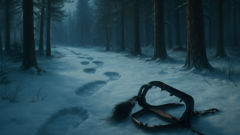
In the weeks that followed, stories multiplied. Sergei, a lumberman, spoke of hearing a low, guttural call echoing through the forest at night. Anya, a schoolteacher, found her sled overturned, with wide swathes of frozen earth torn up beside it. Hunters returned from the taiga with tales of strange, stinking dens hidden beneath the roots of ancient pines. Some claimed to have seen eyes glinting gold in their firelight, set high above the ground—watching, waiting. The sense of unease grew with every new tale. Children hurried home before dusk, mothers barred their doors tighter at night. And yet, for all the fear, there was fascination. The Chuchunya became a subject of whispered debates and half-joking bets. Could such a creature truly exist, hiding in plain sight, evading every trap and bullet?
One evening, as snow drifted against his windows, Mikhail sat hunched by the stove with his grandson, Yuri. The boy’s eyes were wide, brimming with both fear and excitement. “Did you really see it, Dedushka?” he asked. Mikhail nodded, his weathered face grave. “Not clearly. But I felt it. Big as a bear, but smarter. It left no scent. The dogs wouldn’t go near. When I looked outside, I saw nothing but mist—until the prints appeared at my feet.” He placed the strip of hair into Yuri’s small hand. It was coarse as wire, dark as midnight, and heavier than it looked. “Remember, lad,” Mikhail said softly, “the forest gives and takes. The Chuchunya is not evil—but it is not ours.”
The village council debated what to do. Some proposed a hunting party, but the oldest among them urged caution. The Evenki elders recalled stories from their ancestors: the Chuchunya was a guardian of the deep forest, a being to be respected, not pursued. They warned that harm to it would bring misfortune to the hunters and the land itself. Others scoffed at such superstition. In the end, curiosity won. A group of young men—Sergei among them—set out at dawn, rifles slung over their shoulders, determined to find answers. They followed the tracks deep into the taiga, past frozen streams and jagged outcroppings of rock, until the forest grew thick and the light grew thin. The trail twisted on, always just ahead, as if the creature was leading them deeper and deeper.
When they returned days later, their faces were drawn and eyes haunted. They spoke little, except to say that some things in the forest were better left undisturbed. The stories faded again into rumor, but the legend of the Chuchunya—now fueled by fresh fear and awe—would not disappear.
The Watchers and the Watched: Hunters in the Taiga
Yuri grew up under the shadow of the Chuchunya legend. As he matured from wide-eyed boy to skilled young woodsman, the story never left him. Each time he ventured into the forest, he remembered his grandfather’s words—both as a warning and a promise. The taiga was vast and old, full of things unseen by city folk. For Yuri, that was its magic. Yet as the years passed, the world crept in. Logging roads bit deeper into the wilderness, outsiders arrived with trucks and tools, and the quiet was broken by distant engines. The old balance felt fragile, threatened.
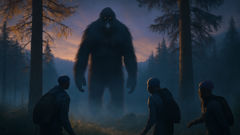
When a group of university researchers arrived from Moscow, seeking proof of the Chuchunya for a documentary, Yuri was hired as a guide. He was wary—outsiders rarely respected local wisdom—but the promise of extra rations and a new winter coat was hard to refuse. Dr. Ekaterina Lebedeva led the group: sharp-eyed, full of skeptical questions, yet surprisingly open to Yuri’s tales. They brought camera traps, infrared scanners, satellite phones—more technology than the village had ever seen.
Their camp was set near a bend in the river where strange tracks had been found. At night, as the wind moaned through the branches, Yuri listened to the researchers debate around their fire. “It’s likely just a bear with mange,” muttered Ivan, the cameraman. “Or an escaped circus ape,” joked another. Yet as days passed and their instruments caught nothing but shifting trees and fleeting deer, even the skeptics grew uneasy. The taiga seemed to close in around them. Strange calls echoed from the darkness. Something large crashed through the underbrush near their tents one night, leaving behind only a musky scent and fresh, impossibly wide footprints by morning.
One evening, Yuri led Dr. Lebedeva and Ivan deeper into the forest to check their last camera trap. The sun hung low, bleeding red through the trees. As they walked, a sudden hush fell—a silence so complete it was almost painful. Birds ceased their calls; even the wind seemed to still. That’s when they saw it. Half-shrouded by mist between two ancient larches stood a figure: massive, upright, covered in shaggy gray-black fur that caught the dying light. It did not run. For a long moment, it simply watched them—its eyes reflecting an eerie, amber glow. Then, with impossible speed and silence, it melted back into the trees.
Ivan fumbled for his camera, but it was too late. Only a faint shape remained on the video—a blur on the edge of vision. Dr. Lebedeva was shaken, her skepticism cracked by awe. “Did you see—?” she whispered. Yuri nodded, heart pounding with both fear and vindication. They hurried back to camp, unwilling to stay as night fell.
In the days that followed, tension grew. Equipment went missing from the camp, food stores were overturned. Camera traps were found torn from trees and smashed. The team argued about whether to remain or retreat. Yuri counseled respect—“You are guests here,” he warned. “This is its home.” But pride and curiosity held the outsiders fast.
On the seventh night, a storm rolled in. Thunder cracked across the sky, and the wind howled like an animal in pain. In the chaos, something moved through the camp—shadows larger than any bear, footsteps soft but heavy. Yuri glimpsed a hulking silhouette at the edge of the firelight, watching. The air was thick with fear and awe. By dawn, the storm had passed, but the camp was in shambles. The researchers packed hurriedly, shaken by their brushes with the unknown. They left behind more questions than answers—and a healthy respect for the deep wilds of Siberia. For Yuri, one truth remained: in this land, some mysteries were not meant to be solved.
Between Worlds: The Chuchunya Revealed
The legend might have faded again, like footprints washed away by new snow, if not for what happened that spring. The Lena thawed, swelling with ice and silt; animals emerged from hibernation. Life returned to the taiga in a thousand small ways. Yuri resumed his routines—checking traps, mending nets, tending to his family’s needs. He did his best to put the Chuchunya out of mind. Yet the sense of being watched never left him. Sometimes, at dawn, he’d glimpse odd shapes among the trees or find woven grass mats near his traps—signs he could neither explain nor ignore.
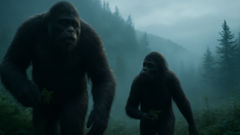
One misty morning, while foraging for mushrooms on a remote ridge, Yuri heard something crashing through the undergrowth. He froze, heart thudding. From behind a boulder emerged not one, but two Chuchunya: one immense and broad-shouldered, the other smaller and more slender. The larger paused, sniffing the air, then let out a low, guttural sound—a voice both wild and almost mournful. The smaller one moved with surprising grace, pausing to gather roots and berries.
Yuri dared not move, barely breathing as he watched them interact. Their gestures were uncannily human—sharing food, grooming each other with huge hands. For a moment, Yuri felt a kinship, as if witnessing a secret family life hidden from human eyes for centuries. He realized that the Chuchunya were not monsters or ghosts, but living creatures—rare, intelligent, wary of humans but not without curiosity themselves.
When a branch snapped beneath his boot, both creatures turned sharply. Their eyes locked with his; time seemed to stand still. Then, with gentle caution, the larger Chuchunya took a single step forward, extending a palm in a gesture that could have been peace or warning. Yuri stood his ground, remembering his grandfather’s words: respect. He lowered his gaze, bowing slightly. The Chuchunya seemed to understand. After a tense pause, they faded back into the forest without haste, leaving Yuri trembling and exhilarated.
He returned home changed, unable to speak of what he’d seen for days. When he finally confided in his mother and a few trusted elders, they listened without judgment. To them, such encounters were not cause for fear or fame but for humility. “The forest is wide,” said his mother. “There is room for all who walk softly.”
News of Yuri’s experience spread slowly, mingling with old tales and new. Some in the village dismissed it as imagination; others nodded knowingly. Dr. Lebedeva wrote to him from Moscow, asking for details. He replied only with thanks and a suggestion: “Trust the forest. Protect what you do not understand.”
Years passed. The logging roads grew quiet as regulations changed, preserving more of the taiga. The Chuchunya was spoken of less as a threat and more as a symbol—a reminder of all that lay beyond easy explanation. Yuri took his own children into the woods, teaching them to read tracks in the snow, to respect silence, and to listen for the voices of things unseen.
On clear nights when the aurora danced overhead, stories of the Chuchunya were still told by firelight—not as warnings, but as invitations to wonder. In the Siberian wilds, mystery endures, and with it, hope for coexistence between worlds both human and wild.
Conclusion
The Chuchunya remains, as it always has, somewhere between legend and reality—a living shadow gliding through Siberia’s ancient forests. For every witness who emerges from the taiga with a story or a scrap of evidence, a hundred more mysteries deepen in the silence beneath the trees. In this land where nature reigns, humans are guests—temporary visitors in a realm shaped by ice and time. The legend endures not because it is easily explained, but because it speaks to something deep within us: a longing for wildness, for mysteries unsolved, for coexistence with things larger than ourselves.
Yuri’s life was marked by this legend, not as a burden but as a blessing—a constant reminder that humility and respect are the true keys to surviving in a world of secrets. The Chuchunya stands not just as a cryptid to be proven or disproven, but as a guardian of Siberia’s last untouched places—a symbol of the unknown that still thrives at the edge of human knowledge. In every footprint left behind in fresh snow, every fleeting shadow glimpsed at dusk, lies a challenge: to honor what we cannot fully understand, to preserve the wildness that remains, and to pass its stories down so that future generations will remember that not all wonders need explanation.
And so, as long as there are forests, long winters, and curious hearts willing to listen, the Chuchunya will walk the taiga—unseen, unbroken, and forever free.

